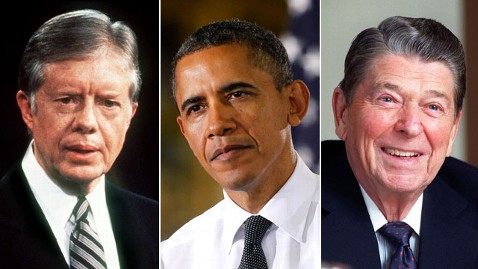Is Obama More Like Reagan or Carter?

AP Photo/Getty Images
President Obama has cited Ronald Reagan as a model of the type of political transformation he hopes to create in the U.S. – even while trying to move the country away from Reagan-era policies. Both men suffered defeats after two years in office and suffered flagging approval ratings.
Much has been made of the similarities in the arc of the two men’s approval ratings. Time magazine went so far as to put an illustration of Obama and Reagan on a cover together early this year.
Time wrote about meetings President Obama had with presidential historians where he peppered them with questions on how Reagan rebounded from low approval in tough economic times to win a landslide reelection.
Read more about similarities between Obama and Reagan.
But while Reagan’s approval had, by this point in his presidency, started to recover, Obama’s has not.
Obama’s approval rating is near the lowest point of his presidency – 43 percent – according to a daily tracking poll of presidential approval by Gallup. Reagan’s, by early December, at this point in his presidency, was at 53 percent. Carter had been lower – as low as 28 percent – in the summer of 1979, but was in the process of a rebound amid the Iran hostage crisis.
Just as Obama and his campaign have sought inspiration in Reagan similarities, Republicans are now arguing that Obama is much more of a Carter.
Carter’s rebound lasted a few months into 1980, but his approval rating was in the low 30s again when he lost his reelection bid to Ronald Reagan.
The National Republican Senatorial Campaign puts the comparison to work in a new Web ad that juxtaposes President Obama’s comment that American business has been “lazy” about selling itself abroad to Carter’s address to the nation at the end of the summer in 1979 that Americans were undergoing a “crisis of confidence.”
Carter’s speech – which became known as his “malaise speech” even though he never used the word “malaise” - is seen as an important marker in his presidency, especially when juxtaposed with Reagan’s message of hope.
Republicans have paired the word “malaise” with Obama’s “lazy” comment to create the ad, “malazy.”
ABC pollster Gary Langer doesn’t see a lot of room to compare Obama and Carter’s approval at this point.
“Presidential approval is situational, not chronological. In terms of assessing Obama’s popularity, what’s relevant is not his approval at any given month, but his approval in given conditions – in this case, very difficult economic conditions. The most recent comparisons are Bush ’08, Bush ’92 and Reagan ’83, all of whom were as unpopular as Obama (Reagan) or more so (both Bushes),” said Langer.
But Langer said President Obama’s approval rating should be a cause of great concern to the White House.
“Assessing electability is another thing,” he said. “Presidents with approval ratings in the mid-40s tend not to get re-elected. And, as we’ve reported, views that the country is seriously off on the wrong track have been as bad as they currently are a year out from a presidential election only three times previously. In each of those cases, the incumbents – Ford, Carter and Bush 41 – ultimately lost re-election.”
There are also some very important differences between Carter and Obama. Carter faced a tough primary fight from Sen. Edward Kennedy, D-Mass., who attacked the sitting president from the left, suggesting he wasn’t representing labor unions and standing up for civil rights. That challenge carried on long after Kennedy had a chance of winning – all the way to the Democratic convention, and it likely had the effect of weakening Carter among his base heading into his contest with Reagan.
Obama, on the other hand, still enjoys high approval among Democrats and faces no serious primary challenge. That could be a silver lining, if there is one, as his advisers pore over polling data.